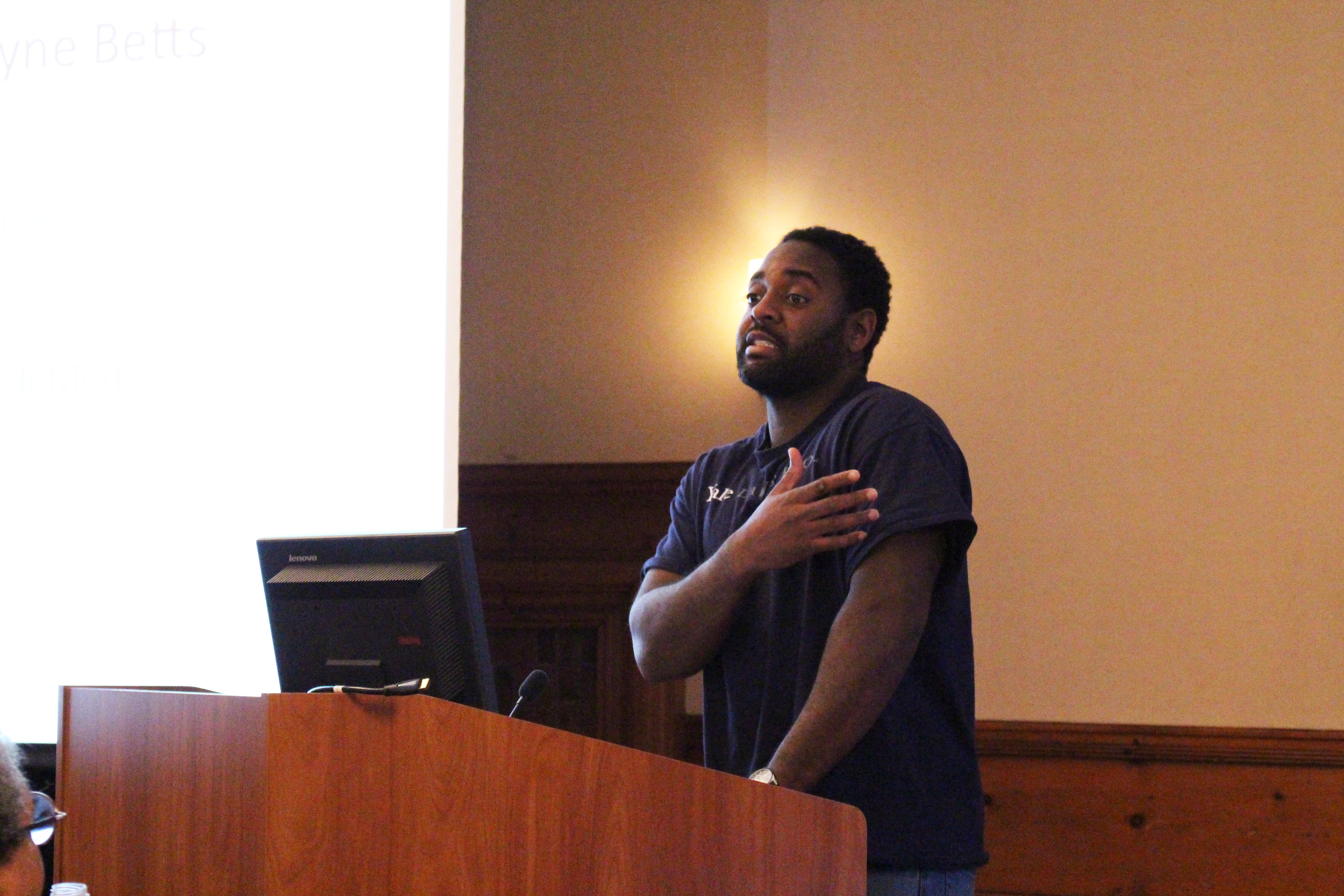
Reginald Dwayne Betts LAW ’16 — an award-winning author and poet, former high school writing teacher and current student at Yale Law School — got his start in an unusual place: Fairfax County Jail, where he spent eight years in prison for carjacking.
At 5 p.m. on Thursday, over 70 people from the Yale and New Haven community crowded into the Beaumont Room at the Sterling Hall of Medicine to hear Betts’ story. The talk — which was hosted by the Program for Humanities in Medicine and co-sponsored by the Offices of Multicultural Affairs, Student Affairs and the Yale Student National Medical Association/Latino Medical Student Association — was a forum for Betts to read excerpts from his memoir and book of poems, and for him to discuss problems within the criminal justice system.
“Tonight, Reginald Dwayne Betts has joined us to reflect on a journey,” Nientara Anderson MED ’19 said in opening remarks. “He invites us to contemplate complex issues with empathy.”
Betts’ story began when he was arrested for carjacking at age 16 and tried as an adult. He subsequently spent eight years in Fairfax County Jail in Virginia, near his hometown of Washington, D.C., during which time he completed high school. He also read and wrote poetry during his time in prison.
Upon his release, Betts, who is now 36, went on to work at a bookstore in Maryland, where he was eventually promoted to store manager. He earned his bachelor’s degree at the University of Maryland, taught poetry in middle schools and high schools in Washington, D.C. and now attends Yale Law School. His memoir, published in 2010, was awarded the NAACP Image Award for Outstanding Literary Work. He now frequently hosts talks and readings at various universities and high schools.
“I’ve made friends with people in the worst prisons and best law schools in the country,” he said.
At the event, Betts spent about half an hour reading excerpts from his works before opening the floor to discussion. His memoir begins with the moment he was brought to prison and ends with his ultimate release, and it brings up controversial issues about the intersection between criminal and racial justice. At one point in his memoir, he writes, “Add my name to the toll of black men behind bars.”
Jeremiah Cross MED ’19, co-president of SNMA/LMSA and a moderator of the talk, said he was especially drawn to Betts’ recurring references to 30 minutes — the time it took for Betts to commit the crime that landed him in prison.
“[Betts] even mentioned at one point that it took only 30 minutes for [him] to become a statistic,” Cross said. “But when I think of the incarcerated, I think of something hardened, premeditated.”
Betts was quick to address the misconception that all people in prison are hardened criminals. He said “prison as an institution hardens people,” and that the rough conditions of prison — not the individuals inside it — are what society needs to examine further.
In fact, Betts said, the stigma surrounding criminal records has held him back from various opportunities. He mentioned that he had a full tuition scholarship to Howard University, but when they found out he had gone to prison, the school revoked it. Even after earning an undergraduate degree and going to law school, he has still lost job opportunities due to background checks.
“We’ve got to change the way we stigmatize people with criminal records,” he said. “We need to use legislation to get people their civil rights back.”
Betts is still not allowed to vote in some states. He said that this affects his peers as well, many of whom have been locked up for various “low-level felonies” that, according to him, should not prevent them from having basic civil liberties.
Sascha Murillo MED ’19, the other co-president of SNMA/LMSA and moderator of the talk, mentioned a “Ban the Box” program at Yale-New Haven Hospital. According to Murillo, this initiative would eliminate the question on job applications of whether or not the applicant has a criminal record.
Betts also cited the unfortunate prevalence of violence in the community where he grew up, as well as a lack of support, as the reason that “so many black men ages 18 to 35 end up in prison.” He described a story in which, during a celebration after Barack Obama’s first election, one of his students said that his brother had been shot the night before — but the other students just kept celebrating.
“There’s always this trauma that lies just below the surface,” he said. “It’s this trauma, this tragedy, that we ignore.”
Jean Kalick Molot, a local who frequents the Humanities in Medicine events, said this event was “the most well attended by far.” She said she left feeling inspired and in awe of how much Betts had to say about social justice.
According to the Bureau of Justice Statistics, one in three black men will go to prison in his lifetime.







